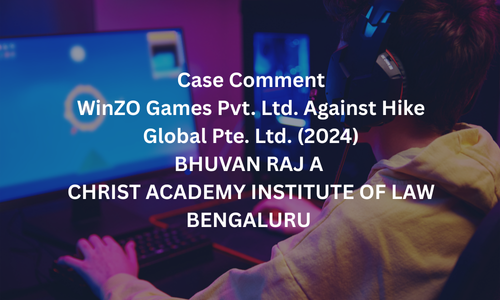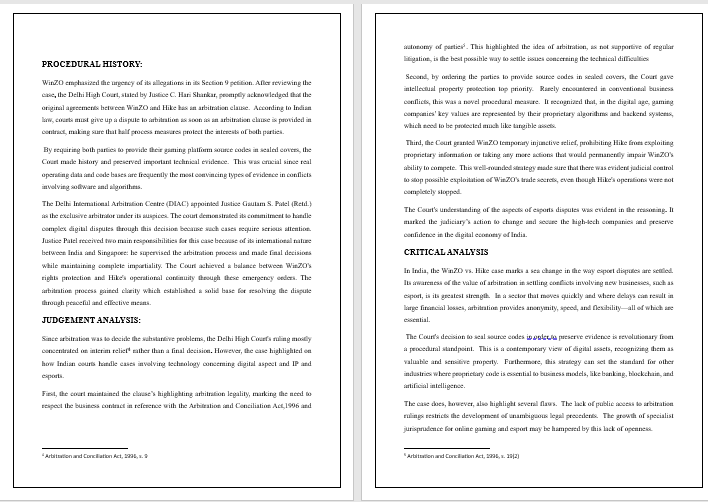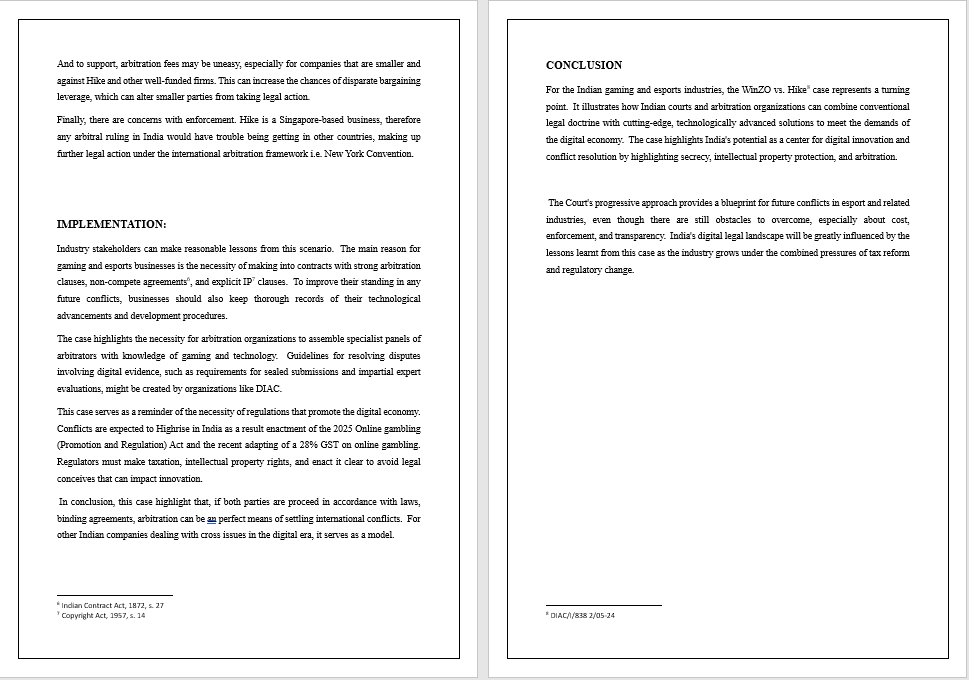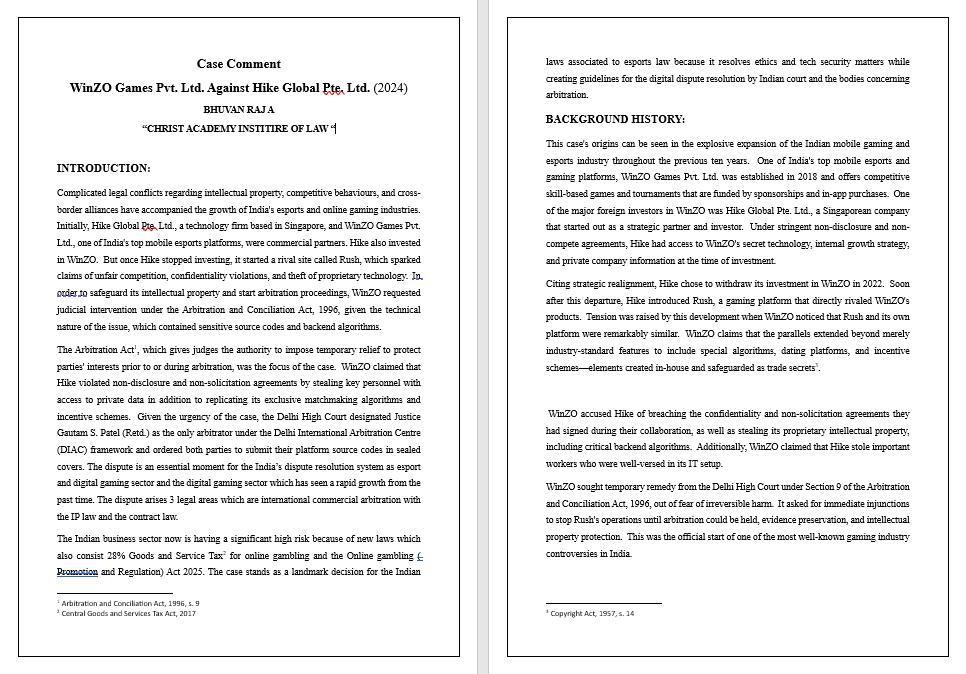Case Comment
WinZO Games Pvt. Ltd. Against Hike Global Pte. Ltd. (2024)
BHUVAN RAJ A
“CHRIST ACADEMY INSTITIRE OF LAW , BENGALURU “
INTRODUCTION:
Complicated legal conflicts regarding intellectual property, competitive behaviors, and cross-border alliances have accompanied the growth of India’s esports and online gaming industries. Initially, Hike Global Pte. Ltd., a technology firm based in Singapore, and WinZO Games Pvt. Ltd., one of India’s top mobile esports platforms, were commercial partners. Hike also invested in WinZO. But once Hike stopped investing, it started a rival site called Rush, which sparked claims of unfair competition, confidentiality violations, and theft of proprietary technology. In order to safeguard its intellectual property and start arbitration proceedings, WinZO requested judicial intervention under the Arbitration and Conciliation Act, 1996, given the technical nature of the issue, which contained sensitive source codes and backend algorithms.
The Arbitration Act[1], which gives judges the authority to impose temporary relief to protect parties’ interests prior to or during arbitration, was the focus of the case. WinZO claimed that Hike violated non-disclosure and non-solicitation agreements by stealing key personnel with access to private data in addition to replicating its exclusive matchmaking algorithms and incentive schemes. Given the urgency of the case, the Delhi High Court designated Justice Gautam S. Patel (Retd.) as the only arbitrator under the Delhi International Arbitration Centre (DIAC) framework and ordered both parties to submit their platform source codes in sealed covers. The dispute is an essential moment for the India’s dispute resolution system as esport and digital gaming sector and the digital gaming sector which has seen a rapid growth from the past time. The dispute arises 3 legal areas which are international commercial arbitration with the IP law and the contract law.
The Indian business sector now is having a significant high risk because of new laws which also consist 28% Goods and Service Tax[2] for online gambling and the Online gambling ( Promotion and Regulation) Act 2025. The case stands as a landmark decision for the Indian laws associated to esports law because it resolves ethics and tech security matters while creating guidelines for the digital dispute resolution by Indian court and the bodies concerning arbitration.
BACKGROUND HISTORY:
This case’s origins can be seen in the explosive expansion of the Indian mobile gaming and esports industry throughout the previous ten years. One of India’s top mobile esports and gaming platforms, WinZO Games Pvt. Ltd. was established in 2018 and offers competitive skill-based games and tournaments that are funded by sponsorships and in-app purchases. One of the major foreign investors in WinZO was Hike Global Pte. Ltd., a Singaporean company that started out as a strategic partner and investor. Under stringent non-disclosure and non-compete agreements, Hike had access to WinZO’s secret technology, internal growth strategy, and private company information at the time of investment.
Citing strategic realignment, Hike chose to withdraw its investment in WinZO in 2022. Soon after this departure, Hike introduced Rush, a gaming platform that directly rivaled WinZO’s products. Tension was raised by this development when WinZO noticed that Rush and its own platform were remarkably similar. WinZO claims that the parallels extended beyond merely industry-standard features to include special algorithms, dating platforms, and incentive schemes—elements created in-house and safeguarded as trade secrets[3].
WinZO accused Hike of breaching the confidentiality and non-solicitation agreements they had signed during their collaboration, as well as stealing its proprietary intellectual property, including critical backend algorithms. Additionally, WinZO claimed that Hike stole important workers who were well-versed in its IT setup.
WinZO sought temporary remedy from the Delhi High Court under Section 9 of the Arbitration and Conciliation Act, 1996, out of fear of irreversible harm. It asked for immediate injunctions to stop Rush’s operations until arbitration could be held, evidence preservation, and intellectual property protection. This was the official start of one of the most well-known gaming industry controversies in India.
PROCEDURAL HISTORY:
WinZO emphasized the urgency of its allegations in its Section 9 petition. After reviewing the case, the Delhi High Court, stated by Justice C. Hari Shankar, promptly acknowledged that the original agreements between WinZO and Hike has an arbitration clause. According to Indian law, courts must give up a dispute to arbitration as soon as an arbitration clause is provided in contract, making sure that half process measures protect the interests of both parties.
By requiring both parties to provide their gaming platform source codes in sealed covers, the Court made history and preserved important technical evidence. This was crucial since real operating data and code bases are frequently the most convincing types of evidence in conflicts involving software and algorithms.
The Delhi International Arbitration Centre (DIAC) appointed Justice Gautam S. Patel (Retd.) as the exclusive arbitrator under its auspices. The court demonstrated its commitment to handle complex digital disputes through this decision because such cases require serious attention. Justice Patel received two main responsibilities for this case because of its international nature between India and Singapore: he supervised the arbitration process and made final decisions while maintaining complete impartiality. The Court achieved a balance between WinZO’s rights protection and Hike’s operational continuity through these emergency orders. The arbitration process gained clarity which established a solid base for resolving the dispute through peaceful and effective means.
JUDGEMENT ANALYSIS:
Since arbitration was to decide the substantive problems, the Delhi High Court’s ruling mostly concentrated on interim relief[4] rather than a final decision. However, the case highlighted on how Indian courts handle cases involving technology concerning digital aspect and IP and esports.
First, the court maintained the clause’s highlighting arbitration legality, marking the need to respect the business contract in reference with the Arbitration and Conciliation Act,1996 and autonomy of parties[5]. This highlighted the idea of arbitration, as not supportive of regular litigation, is the best possible way to settle issues concerning the technical difficulties
Second, by ordering the parties to provide source codes in sealed covers, the Court gave intellectual property protection top priority. Rarely encountered in conventional business conflicts, this was a novel procedural measure. It recognized that, in the digital age, gaming companies’ key values are represented by their proprietary algorithms and backend systems, which need to be protected much like tangible assets.
Third, the Court granted WinZO temporary injunctive relief, prohibiting Hike from exploiting proprietary information or taking any more actions that would permanently impair WinZO’s ability to compete. This well-rounded strategy made sure that there was evident judicial control to stop possible exploitation of WinZO’s trade secrets, even though Hike’s operations were not completely stopped.
The Court’s understanding of the aspects of esports disputes was evident in the reasoning. It marked the judiciary’s action to change and secure the high-tech companies and preserve confidence in the digital economy of India.
CRITICAL ANALYSIS
In India, the WinZO vs. Hike case marks a sea change in the way esport disputes are settled. Its awareness of the value of arbitration in settling conflicts involving new businesses, such as esport, is its greatest strength. In a sector that moves quickly and where delays can result in large financial losses, arbitration provides anonymity, speed, and flexibility—all of which are essential.
The Court’s decision to seal source codes in order to preserve evidence is revolutionary from a procedural standpoint. This is a contemporary view of digital assets, recognizing them as valuable and sensitive property. Furthermore, this strategy can set the standard for other industries where proprietary code is essential to business models, like banking, blockchain, and artificial intelligence.
The case does, however, also highlight several flaws. The lack of public access to arbitration rulings restricts the development of unambiguous legal precedents. The growth of specialist jurisprudence for online gaming and esport may be hampered by this lack of openness.
And to support, arbitration fees may be uneasy, especially for companies that are smaller and against Hike and other well-funded firms. This can increase the chances of disparate bargaining leverage, which can alter smaller parties from taking legal action.
Finally, there are concerns with enforcement. Hike is a Singapore-based business, therefore any arbitral ruling in India would have trouble being getting in other countries, making up further legal action under the international arbitration framework i.e. New York Convention.
IMPLEMENTATION:
Industry stakeholders can make reasonable lessons from this scenario. The main reason for gaming and esports businesses is the necessity of making into contracts with strong arbitration clauses, non-compete agreements[6], and explicit IP[7] clauses. To improve their standing in any future conflicts, businesses should also keep thorough records of their technological advancements and development procedures.
The case highlights the necessity for arbitration organizations to assemble specialist panels of arbitrators with knowledge of gaming and technology. Guidelines for resolving disputes involving digital evidence, such as requirements for sealed submissions and impartial expert evaluations, might be created by organizations like DIAC.
This case serves as a reminder of the necessity of regulations that promote the digital economy. Conflicts are expected to Highrise in India as a result enactment of the 2025 Online gambling (Promotion and Regulation) Act and the recent adapting of a 28% GST on online gambling. Regulators must make taxation, intellectual property rights, and enact it clear to avoid legal conceives that can impact innovation.
In conclusion, this case highlight that, if both parties are proceed in accordance with laws, binding agreements, arbitration can be an perfect means of settling international conflicts. For other Indian companies dealing with cross issues in the digital era, it serves as a model.
CONCLUSION
For the Indian gaming and esports industries, the WinZO vs. Hike[8] case represents a turning point. It illustrates how Indian courts and arbitration organizations can combine conventional legal doctrine with cutting-edge, technologically advanced solutions to meet the demands of the digital economy. The case highlights India’s potential as a center for digital innovation and conflict resolution by highlighting secrecy, intellectual property protection, and arbitration.
The Court’s progressive approach provides a blueprint for future conflicts in esport and related industries, even though there are still obstacles to overcome, especially about cost, enforcement, and transparency. India’s digital legal landscape will be greatly influenced by the lessons learnt from this case as the industry grows under the combined pressures of tax reform and regulatory change.
[1] Arbitration and Conciliation Act, 1996, s. 9
[2] Central Goods and Services Tax Act, 2017
[3] Copyright Act, 1957, s. 14
[4] Arbitration and Conciliation Act, 1996, s. 9
[5] Arbitration and Conciliation Act, 1996, s. 19(2)
[6] Indian Contract Act, 1872, s. 27
[7] Copyright Act, 1957, s. 14
[8] DIAC/I/838 2/05-24




